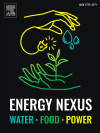New publication on Energy Nexus
 The paper "Integrated Water-Energy Modeling in TEMOA Energy System Optimization Model: Pantelleria Case Study",by Farzaneh Amir Kavei, Maria Elena Alfano, Matteo Nicoli, Francesco Quatraro and Laura Savoldi is now available on "Energy Nexus".
The paper "Integrated Water-Energy Modeling in TEMOA Energy System Optimization Model: Pantelleria Case Study",by Farzaneh Amir Kavei, Maria Elena Alfano, Matteo Nicoli, Francesco Quatraro and Laura Savoldi is now available on "Energy Nexus".
Energy transition is not just about changes in the generation and consumption patterns of energy commodities. Completely sustainable policy and action plans require a comprehensive analysis of the requirements and interconnectivity of the energy supply and demand with other resources such as water, land or materials.
This is why it is necessary to be equipped with instruments able to deliver a wider perspective by incorporating the energy-X nexus.
Energy System Optimization Models (ESOMs), key tools in delivering a complete insight into energy systems often focus on energy aspects and overlook interdependencies among energy and other resources. The increasing demand for water and energy, together with supply uncertainties, underscores the importance of integrated resource modeling.
TEMOA-Pantelleria is an integrated Open-source Energy System Optimization Water-Energy Model. The model spanning from 2014 to 2050 studies the Pantelleria Island energy transition path. The isolated water and energy systems of Pantelleria and its vulnerability towards climate change were among the reasons for choosing it as the case study.
To develop the model, after the development of the Reference Energy Ssytem and analogue to it, the Reference Water System was developed (see first figure). The linkage of the two modules was stablished through the technologies consuming both water and energy, such as desalination plant (see second figure).
The integrated model proved to be more powerful in revealing the reciprocal effect of the water supply methods and energy consumption. Moreover, it demonstrated how the state of the water pipelines can impact the energy consumption of the island.
Introduction of water reuse in the water supply of the model showed a restricted impact on the energy and water consumption of the island. It is due to the economic structure of the island and the limited opportunities for the use of reclaimed water. The reclaimed water reuse could become meaningful in the case of its further utilisation in hydrogen generation from electrolysis or agricultural uses, absent in the actual state of the Island.
Abstract
This study addresses the limited integration of water-energy nexus dynamics in energy system models, particularly the lack of hard-linked modeling approaches. The aim is to develop and apply an integrated water-energy model using the open-source TEMOA framework, addressing the gap in quantifying reciprocal impacts between water and energy systems. The Island of Pantelleria serves as a case study due to its isolated infrastructure and ambitious decarbonization targets. First, a Reference Energy System is built and validated by comparing historical outcomes with past data and future projections with official transition scenarios. The model is then extended through the development of a detailed Reference Water System, incorporating water supply, treatment, and demand processes. Several scenarios are analyzed, including a zero-emission policy, reduction of water losses, increased in-situ water supply, and replacement of the primary wastewater treatment plant with a secondary one. Results show that the integrated model reveals substantial differences from the energy-only model. In particular, the ‘Clean Energy for EU Islands’ target indicates higher electricity consumption when water desalination is replaced by water import, an effect not captured by the energy-only model. Additionally, integrating fixed and variable components of water demand improved projection accuracy. The study concludes that a hard-linked water-energy modeling approach offers a more comprehensive understanding of the interdependencies between water and energy systems. This is crucial for planning effective, resource-efficient decarbonization strategies in isolated or resource-constrained contexts.

